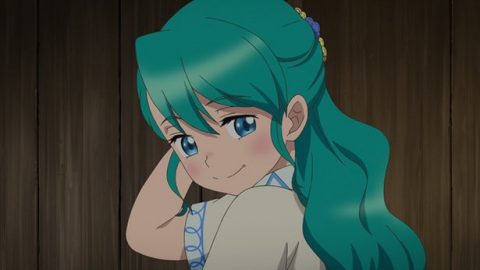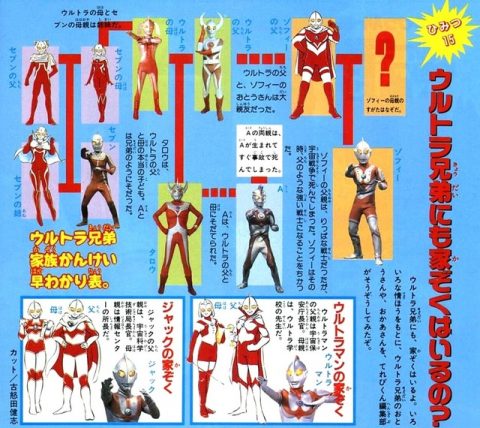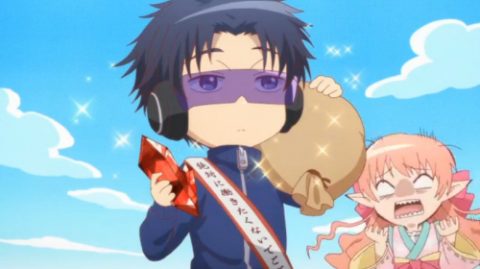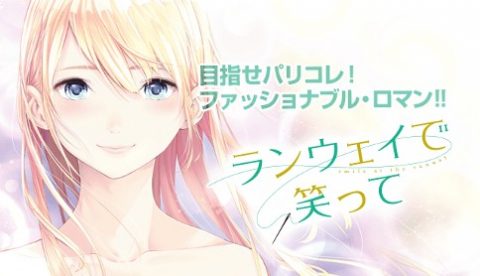"The Quintessential Quintuplets" is a hugely popular love comedy featuring five charming siblings with unique personalities. Sitting in front of the TV in a dimly lit room, staring at the many adorable characters, you'll often find yourself grinning from ear to ear. Naturally, the work is filled with numerous depictions and story developments that hint at the themes the author is trying to convey. This time, I'd like to take a closer look at the themes of "The Quintessential Quintuplets," a work that can be easily overlooked by casual viewers. It's just a romantic comedy, but it's still a romantic comedy. Because it's an anime that you'll want to watch with a warm and fuzzy feeling, I think it's important to pick up on themes that others might overlook. Analyzing the themes within the work, such as why Yotsuba was chosen, reveals many things, so I hope you'll read this article to the end.
What is the theme of "The Quintessential Quintuplets"?
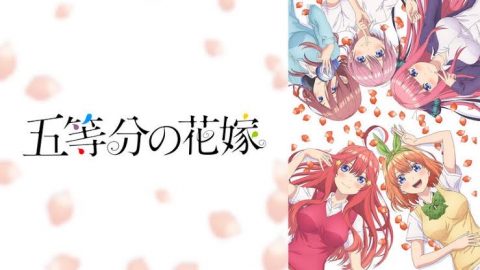
Now, let me just say it right off the bat: I believe the theme of "The Quintessential Quintuplets" is "acquiring individuality." The numerous settings and events that occur throughout the story all make sense the moment you consider the theme of "The Quintessential Quintuplets" to be "acquiring individuality." In other words, we can infer that the author created each setting and event with the intention of making viewers aware of this theme. So, I'd like to explain step by step why the theme of "The Quintessential Quintuplets" is "acquiring individuality."
They all have the same face
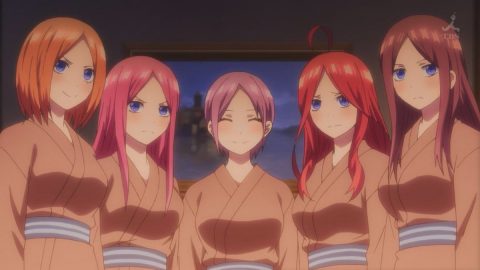
Naturally, as quintuplets, all of the sisters have similar faces and body types, but why did the author come up with the idea of making quintuplets with identical faces the heroines in the first place? The moment you consider the theme of the work, "acquiring individuality," the author's intention becomes clear. In other words, if the theme of the work is "acquiring individuality," if the heroines are to acquire individuality, it would be more convenient for each of them to be a character without distinctive features.
The Quintuplets Were Originally One
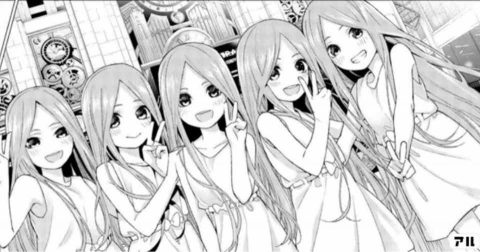
However, many people may have felt a bit uneasy when they were told that the quintuplets were completely Quirkless. While each quintuplet looks similar, they already have distinctive personalities and appearances that make them easily recognizable, so it's hard to believe that each one is Quirkless. However, the story clearly shows that there was a time when the quintuplets were Quirkless. That's right, when their mother was alive, they all dressed alike and were completely Quirkless. In other words, the quintuplets' current appearances are the result of each of them working hard to acquire their own Quirks, starting from a state of being Quirkless.
Why do people acquire Quirks?
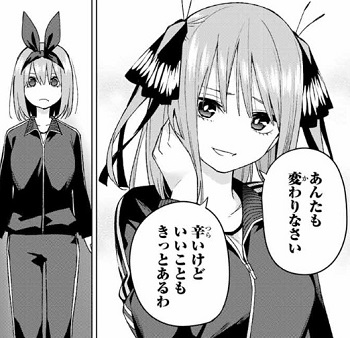
So why did the quintuplets need to acquire Quirks? This problem is not only present in this work, but is also common to the way children grow up in real life. As children, they have a father and mother, so they don't need to acquire Quirks, because even without a Quirk, their father and mother will unconditionally support them. However, as children grow, they must become independent from their parents. When they break free from their parents' support, things like family, which they had previously been able to obtain unconditionally, become something that they can only obtain if they are chosen by someone. When the father of the quintuplets in this film sadly says, "My daughters have recently become more sexually aware," this deep psychological state of children lies in the background. "The Quintessential Quintuplets" succeeds in expressing this process of growth in an easy-to-understand way by using the unique setting of quintuplets.
This leads to the mystery of "Why Yotsuba?"
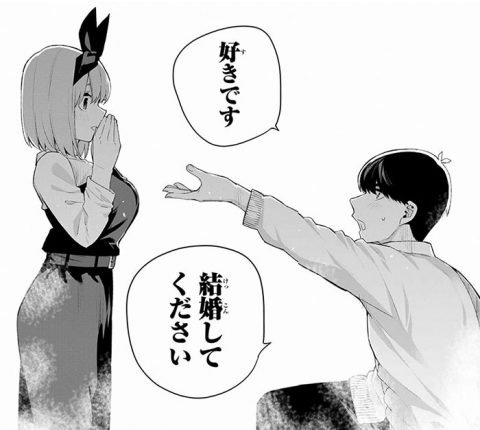
Now that you understand the hidden growth in the setting of "The Quintessential Quintuplets," it's easier to understand why the author wanted to end the story with Futaro choosing Yotsuba.
First Penguin
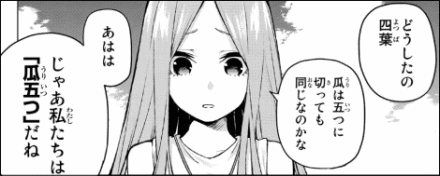
The biggest reason why Yotsuba was chosen by Fuutarou is that she was the first penguin, so to speak, to break away from the community of the quintuplets earlier and more strongly than anyone else. Many people think that this is simply because "she met Fuutarou in Kyoto in the past," but given that Fuutarou clearly rejects Rena, played by Satsuki, in the story, it's a bit of a stretch to think that "the fact that she met Fuutarou in the past in Kyoto was the main reason Fuutarou chose Yotsuba."
Why Yotsuba Acquired Her Quirk
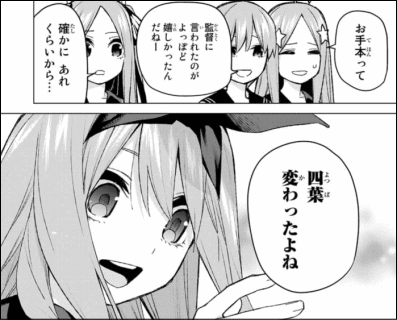
As mentioned above, growing up is essentially about escaping parental support. That's why, after their mother's death, all of the quintuplets, led by Yotsuba, are depicted striving to acquire their own Quirks. However, Yotsuba is an exception, having already made efforts to acquire her Quirk before her mother's death. She even went to show her mother how she was wearing a ribbon, and she was already working on acquiring her Quirk earlier than the other quintuplets. In her case, it seems she wasn't really looking to be chosen by someone, but rather a desire to escape the feeling that she had to work hard for her family's poverty and hardship. Ultimately, her words and actions motivate Fuutarou and become one of the factors that lead to their union. While cleverly concealed, this is clearly a complex theme the author has planted, as evidenced by hindsight.
The Mother's Discomfort
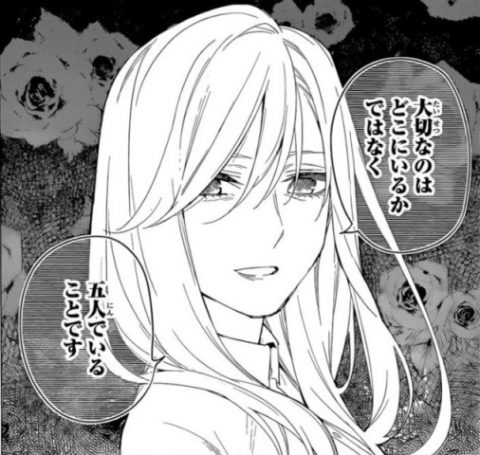
If you've understood the above, you'll understand why Yotsuba's mother didn't respond well to her wearing a ribbon. Naturally, parents want their adorable daughters to be close to them forever, so the mother's reaction to Yotsuba wearing a ribbon was likely due to her maternal instinct, which made her want to protect her daughters with her own hands.
Futaro as a Tutor and Futaro as a Man
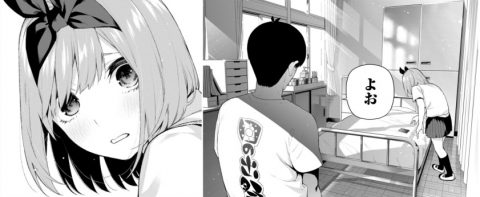
Futaro's statement, "I want the quintuplets to be with me always," may seem contradictory at first glance, but his words "I want the quintuplets to be with me always" do not mean "I want them to be by my side forever as identical beings." Rather, it is a rational desire for each of them to get along well as they should. Futaro as a man cruelly chooses one of the quintuplets, so from another perspective, he is saying no to all of the quintuplets except for Yotsuba. Since he chose Yotsuba as his girlfriend, Futaro's words "I want the quintuplets to be with me all the time" were likely true, but they were a rational response from the perspective of a tutor, and are clearly different from his opinion as a man.
Futaro and His Mother

Did you see how this effectively portrays the difference between his mother, who wanted all the quintuplets to exist together as a community, and Futaro, who chose one special quintuplet to keep for himself? Being caught between two completely different people, their mother and the man they love, is precisely what forces the quintuplets to move forward while struggling.
Why the identity of the bride becomes unclear after marriage
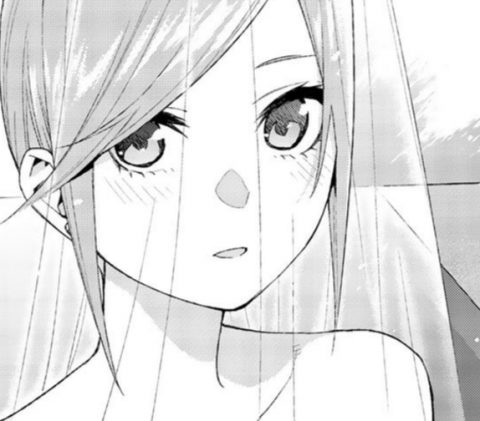
So why does the identity of the bride, who should be the one waiting for them once they've established their individuality, become unclear? This, too, reveals a profound theme planted by the author.
The foreshadowing is resolved!! Grandpa's "Power of Love"
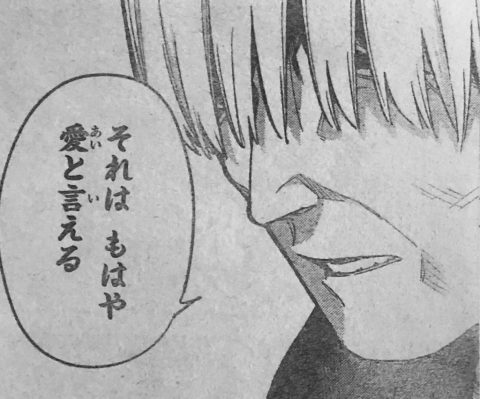
This is where the foreshadowing of the "power of love" mentioned by the quintuplets' grandfather comes into play. Perhaps the reason they no longer know who the bride is is because someone special to them can now recognize them even without their unique personality. At first, they need to make themselves clear to the other person so that they can understand who they are and what they are like. However, as they spend more time together, the other person will come to understand them even without those unique characteristics, and they will no longer need to emphasize their identity. Perhaps the "power of love" Grandpa refers to is the ability to see beyond appearances and see the inner self. This effectively expresses the process of leaving one's mother, emphasizing one's identity in order to be with someone, and then returning to one's natural self once one finds their soulmate, naturally eliminating the need to emphasize one's identity.
The fact that the quintuplets have not been able to marry other men
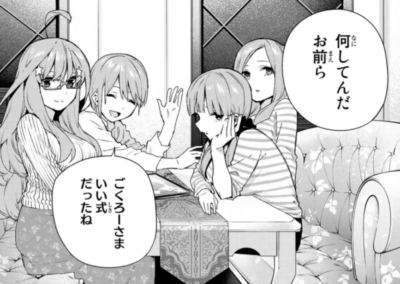
Understanding these points, we can infer another interesting fact. The only one who returned to her original state without emphasizing her identity was Yotsuba, who married Futaro. As readers can see, the other quintuplets still dress in a way that expresses their individuality, just like they did in high school. This implies that none of them have yet married any other men. At the same time, the depiction also highlights the cruelty of Fuutarou's actions in choosing one of the quintuplets.
Summary: The Quintessential Quintuplets is a story of Yotsuba's growth told from Fuutarou's perspective!!
So, when you break down the true themes hidden in The Quintessential Quintuplets, you'll see that it actually contains a deeper theme than you might expect. At first glance, this work may seem like it focuses primarily on the protagonist, Fuutarou, but Fuutarou doesn't grow much throughout the story, and the story isn't centered around his emotional changes. Rather, the key point is how Yotsuba grew and how she ended up being chosen by Fuutarou. This unique structure depicts the process from Fuutarou's perspective, rather than Yotsuba's. When you think about it that way, it's a romantic comedy backed by an incredible theory that logically explains the silly but ideal situation that men desire - an anime where a bunch of cute girls are all messing around together - by saying, "Well, the girls haven't fully grown up yet, and although they've acquired individuality, Fuutarou, the viewer, hasn't yet recognized that, which is why we've ended up with a harem of cute girls all messed up!" I never imagined that just adding the setting of quintuplets to a harem story could give the work such a profound theme, and when I first realized this theme, I couldn't help but mutter, "Haruba Negi is amazing!" It's a work that would be a shame to just stare at the cute characters with a grin on your face, so I encourage everyone to watch the second season and consider the issues in their own way.

